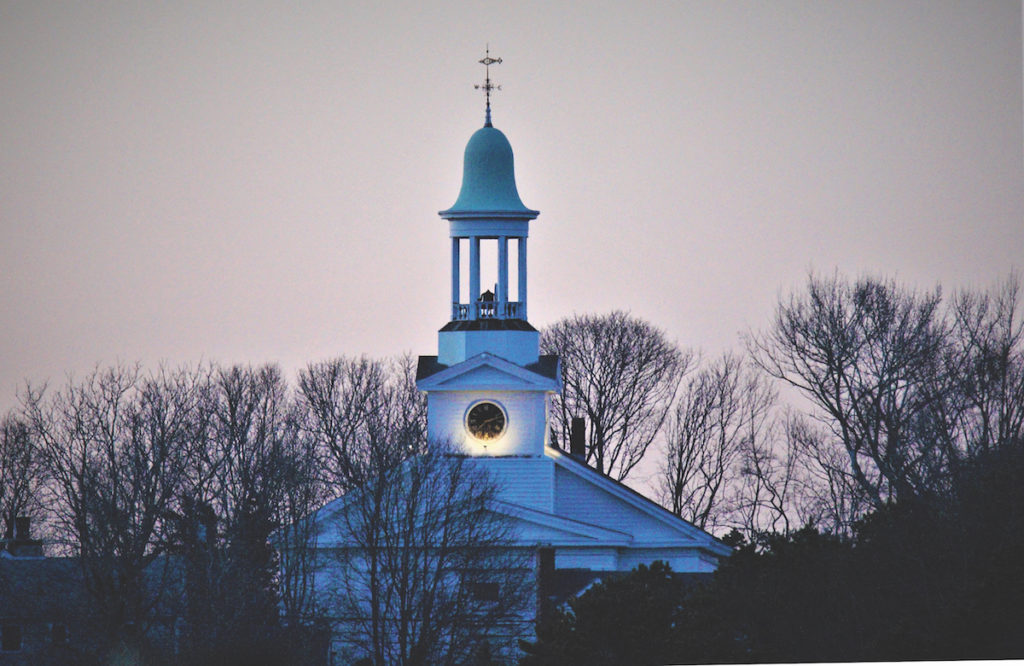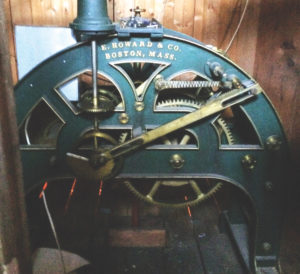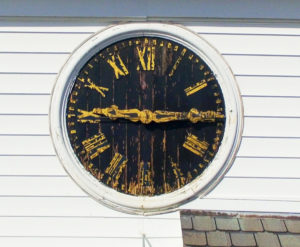
For many in Wellfleet, the sound of bells from the First Congregational Church, at 200 Main St., from around 6 a.m. to 10 p.m., frames their day. It is part of the town soundscape.
The church’s tower clock is, purportedly, the only one in the world to use a ship’s bells striking system. This, the church website asserts, has been vetted by Ripley’s Believe It or Not.
Though the church doesn’t ring the bells overnight, in the ship’s bells system, the day is divided into six four-hour shifts, or “watches,” corresponding to how crews would take turns manning the ship. The watches start at midnight, 4, and 8 a.m., and at noon, 4, and 8 p.m.
For each half-hour that passes within those watches, one bell is added. For instance, if you hear one bell, that means it is 12:30, 4:30, or 8:30 a.m. or p.m. Two bells means it is 1, 5, or 9. Three bells (two bells plus one bell) means 1:30, 5:30, or 9:30. Four bells (two bells plus two bells) means 2, 6, or 10, and so on.

Lawrence R. “Duffy” Gardiner built the mechanism for the ship’s bells striking system at the Congo Church, as it is affectionately called, in 1952. It used a bunch of complicated gears and levers. In the 1970s, however, Duffy insisted it be replaced with an “electronic striking system.”
According to Brad Williams, the church’s minister of music and the president of the Wellfleet Historical Society, what you hear every half-hour now is, essentially, an amplified recording. The same goes for the tunes they play. This is actually true of most churches nowadays. The Congo Church has only one actual bell, and it is rung only on special occasions. Of the old mechanism that Gardiner invented, Williams says, “I don’t know what ever happened to it.”
A side benefit of the bells being a recording: the sound won’t be affected by the Congo Church’s planned restoration of the steeple.
Williams is not entirely happy with all the bell-ringing. “Sometimes, I think of it as noise pollution,” he says. “It’s fine, but they have different sounds for the bells — sometimes a tubular bell, sometimes Flemish bells, which always sound like they are out of tune.”
Though the tower clock and digital bells are calibrated, they are separate entities. The town of Wellfleet owns the clock and hires a person to take care of it. Currently, that person is Leif Valli.
Valli has been taking care of the clock for nearly 20 years, he says. Before him, his father, Charley Valli, who died last year, was the keeper of the clock. Leif’s uncle, Warren Dyer, Wellfleet’s former fire chief, also did it. Now, Leif’s son helps him out.
Valli says he doesn’t have anything to do with the bells, but he does climb up the steeple stairs to change the time at daylight savings (or when the power goes out), to oil the gears, and to set the timer for the lights. Several years back, the clock actually stopped working, but, fortunately, the same type of motor was still in production, and it could be repaired.
When Valli used to help out his father, he’d stand below and give directions (they later got walkie-talkies). “He had to time it, because we didn’t want to be up there when the bells went off — it was loud as heck,” Valli says.

Back then, the three clock faces were glass, so people could see the inverted clock from the inside of the steeple. “My dad used to run his watch a few minutes fast, so the clock would be off by a few minutes,” he says.
Valli says that once, his father, Charley, was waiting outside the old Wellfleet Pharmacy just before opening. Inside, the owner, Jane Parker, was still getting ready. A lady also waiting outside was becoming impatient. She said she knew it was past 9 o’clock, because she had seen the town clock. She turned to Charley and said, “You have a watch, what does your watch say?” Charley responded, “About the same as the clock,” and, adds Valli, “he snickered to himself, because he knew he was responsible for this argument.”
The Congo Church bells and clock are a part of local history. But if you want to hear the bells when you are away from home, they are part of “Hear Cape Cod,” a collection of recordings by Berklee College of Music Professor Steve Wilkes.



